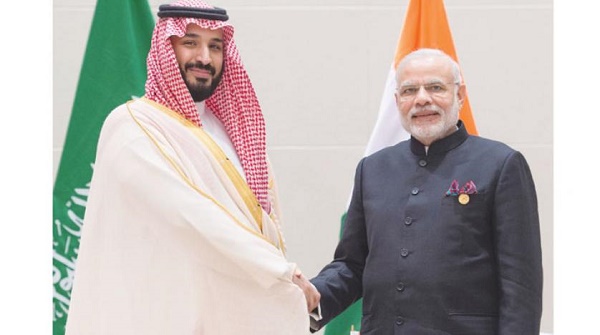Alwaght- On the heels of the deadly attack on the Indian police forces in Kashmir, Saudi Arabia’s Crown Prince bin Salman visited India and Pakistan, while the two neighbors’ tensions have escalated to an alerting level. The economic cooperation with the two countries was high on the agenda of the Asian tour of the Saudi royal. But the different views of Riyadh to the two economic partners since the beginning foiled Riyadh attempts to show equality of views to Pakistan and India and the significance of preserving relations with the two nations which for decades have been engaged in a regional rivalry. The Indian officials’ demand from the crown prince not to directly fly to New Delhi from Islamabad has caught the global media attention. The prince was forced to fly home from Pakistan before flying to the Indian capital. Now the question is why Riyadh cannot walk India-Pakistan tightrope despite his efforts.
Pakistan, an old ally to the Saudis
Established since a long time, the Saudi-Pakistani close relationship is based on the religious and cultural values stemming from a common reading of Salafism, a radical version of Islam. Saudi Arabia has been spending much on religious schools, or madrasas, teaching a fundamentalist version of Sunni faith in Pakistan. It is these madrasas that nurture terrorist groups in the region and worldwide. From the Taliban to Al-Qaeda to ISIS terrorist group to other extremist and terrorist groups that are now active in India trace their roots to these Saudi and Pakistani education centers.
The two side’s bonds are not just cultural. The oil-wealthy kingdom also supports Islamabad financially and diplomatically. When Pakistan was strictly sanctioned by the United Nations for its nuclear bomb tests in 1998, Saudi oil tankers delivered 50,000 oil barrels per day to Pakistani ports for free. In 2015, Saudi Arabia paid the Pakistani government a loan of $1.5 billion to assist the country move out of its hard currency reserve drain crisis. In last week’s visit of the crown prince to Pakistan, bin Salman signed a contract to invest $20 billion in Pakistan’s infrastructural projects.
The two sides are also closely involved in military and intelligence partnership. Pakistani pilots served the Saudis in the 1960s when Saudi Arabia fought the Southern Yemen Republic. And in the underway Saudi aggression, Pakistan has not officially joined the Riyadh-led Arab coalition against Yemen but it sent advisors and pilots to help the Saudis with their campaign, now in its fifth year.
Saudi-Indian relations
Over the past decade, Saudi Arabia and India embarked on increasing cooperation, especially after their contacts to fight terrorism that led to Riyadh help New Delhi catch a number of heads of terror organizations. The bilaterally ties even found larger influence when in 2016 Prince Mohamed unveiled his “Vision 2030, a roadmap designed to cut the monarchy’s reliance on the oil income by diversifying the nation’s income resources. The partnership seeks tech transfer from the Indian firms to Saudi Arabia. The Saudi leaders find the fast-growing Indian economy a suitable pattern and partner to realize their advancement goals.
Strategy and economy confront?
So far, we understood that Saudi Arabia holds stronger strategic relations with Pakistan than with India. This is while Riyadh seeks expanded ties with New Delhi for economic profits and thwarting the Western pressures that come with criticism against bin Salman’s regional policies that culminated in the killing of Jamal Khashoggi, the vocal critic of Mohammed’s policies, at the Saudi consulate in Istanbul. The visit may have drawn welcome of the Indian leaders but it does not persuade them to stop doubt about Saudi intention to enter a strategic partnership with India.
One important reason is the Saudi-exported Wahhabism in Pakistan that has so far proven detrimental to the Indian national security, mainly in Kashmir, a region under India-Pakistan dispute. It can be said that the Wahhabism and terrorism have turned into a play with fire for the Saudis and sometimes have damaged the interests of their own creators. After all, Saudi Arabia under bin Salman should not be deemed the past Wahhabi Saudi Arabia. Bin Salman represents a Saudi Arabia that has stepped in the path of powerful development. In such a situation, the degree of the Saudi success in developing strategic relations with India is tied to Pakistan’s will to contain the hardly tamable Wahhabi terrorists. The controllable type of this terrorism, like ISIS, is currently multiplied by the Americans in various places after it failed to reach its goals in Syria and Iraq, however. Still, the performance of the security and intelligence services in Pakistan is driven not by Islamabad’s partners’ demands but by the country’s key foreign policy principles in two cases of Afghanistan and India tensions. For example, when a couple of months ago Imran Khan became prime minister, his country was facing a financial crisis and the national currency lost 25 percent of its value. When he sought a loan from the International Monetary Fund, Washington opposed the bid and linked it to transparency on China-Pakistan Economic Corridor and Islamabad’s halting of support to the terrorist groups operating in Afghanistan. The US opposition displayed the depth of Pakistan’s differences with one of its closest allies.
So, India cannot turn a blind eye to the fact that the Saudi financial aids are flowing to Pakistan at a time the country is under regional and international pressures to stop its backing to the terrorists. If it was not for the Saudi dollars, the Indians understand, Pakistan’s behaviors could undergo a serious change to alleviate the anti-Islamabad pressures.



























